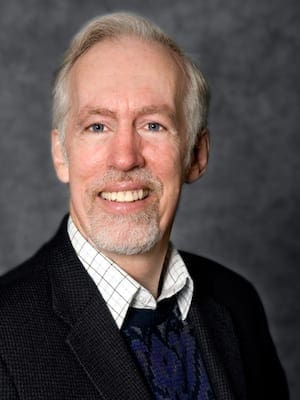I first was invited to a tenure track position as a theology professor by Central Seminary in Shawnee, Kansas, in 1985, only a year out of grad school. I´ve been teaching pretty much continuously ever since.
But my first experience with online teaching began less than two years ago.
When Central first stepped decisively into the internet age in the early ’90s, I was the last faculty holdout, infamous for yellow legal pads full of handwritten notes.
And I was convinced – and remain so – that education, particularly theological education, is as much about relationships as about the impartation of knowledge.
No profession is more personal than ministry.
Ministers are invited into the intimate spaces of people´s lives. We are asked the big questions – about life and death and our ultimate destiny and the meaning of it all – even as we struggle with the same sorts of dilemmas as our questioners.
So how could prospective ministers or – as is more and more common – those who have already launched into ministry develop the skills they need online?
And how dare we who are tasked with the sacred task of guiding their preparation competently judge the capacities of our students if we may never have met them face to face or engaged them in informal conversation?
Nevertheless, both positive and negative factors are driving the current explosion of online learning across the spectrum of higher education, including the hyperpersonal world of theological education.
The negative factors are well-known: skyrocketing costs, the inability or unwillingness of students to relocate for educational opportunities, the declining investment in theological education by denominations and congregations who themselves have dwindling constituencies and resources.
So then, what about the positive?
- Dialogical
As children of the God who has come into our midst in human form through Jesus Christ, who pursues us and hears us and experiences our hopes and fears, we are convicted that all genuine communication is reciprocal.
My most influential theological teachers – such as the Old Testament scholar Brevard Childs and the theologian T.F. Torrance – shared lectures. They were brilliant, emotionally profound lectures, but the communication was one way.
Internet natives live in a world of back and forth, post and response. Ironically, online education – at least theological education – is necessarily two way.
I currently teach in an online master of theological studies program co-sponsored by Palmer Theological Seminary (formerly Eastern) and the American Baptist Board of International Ministries.
I share lectures by video, then we have weekly video conferences and talk to one another.
In fact, I have as much or more personal and small group conversation with these students than I have typically had in traditional classes.
Students also participate in a weekly discussion forum with posts and responses. So, the classes are structurally dialogical and participative.
More and more, as internet natives become predominant among both students and teachers, the perception of screens and distance as barriers will evaporate.
- Accessible
Many traditional seminaries now have regional centers far removed from their historic locations.
For instance, Central Seminary has regional centers in Tennessee and Wisconsin and course offerings in California, Illinois, Missouri, Texas and Washington.
Some of these locations reflect concentrations of students from a particular ethnic or cultural background.
But more generally, if a theological institution understands itself to have a particular stance and mission, why not make that mission as broadly accessible as possible?
Face-to-face offerings in these regional centers are often supplemented by internet offerings. As always, quality control, both with respect to content and experience, are crucial. But that´s true for every delivery mode.
My own experience of professors reading canned notes verbatim in live class sessions was, mercifully, limited, but not nonexistent.
- Contextual
When students and their mentors gather initially and then periodically in a designated site for personal introductions, orientation and mutual encouragement, relationships are often as deep or deeper than when students gather for traditional classes, especially as traditional residential campuses give way to commuter campuses.
This is certainly the case in the Palmer master of theological studies program, where I am teaching.
The “cohorts,” similar to the doctor of ministry cohorts that have become common in recent years, are settings for deeply contextual education, both in the periodic face-to-face meetings and in the online sessions that constitute the majority of the curriculum.
When I engaged the Baja, California, cohort in the program, I found that most of them had pre-existing relationships, challenges and opportunities due to their shared context.
Not only that, but I knew many of the students myself from the several visits I had made to the Dios con Nosotros Seminary of the Baptist Convention of Baja, California, North in Mexicali.
- International
For an increasingly global church living in an increasingly globalized world, followers of Jesus around the world need to learn from and support one another.
The internet can facilitate this across time zones and national boundaries.
Cultural Christianity is fraying in the U.S., and new believers and new churches – some our “daughters,” some with unique roots in their own cultures – are thriving.
Such trends lead to an increased awareness and appreciation of the energy and optimism brought to the U.S. by immigrant churches and immigrant participants in our existing churches.
But we also have something to offer. Appropriately or not, American seminary degrees offer international church leaders a measure of respect and portability their indigenous training often does not.
And ironically, as a bilingual North American, I have been able to open access to theological literature written by Latinos for Latinos to indigenous church leaders whose previous study had been laden with ultra-conservative texts, translated from the English, written by long deceased North Americans.
Online education means that this can occur without students being wrenched from their context, their ministries and – too often – their families.
This is all still new, and we are all still learning. But I think of the Holy Spirit. In the words of Jesus, “The pneuma blows where it chooses … “ (John 3:8).
Editor’s note: This article is part of a series this week focused on trends and issues in theological education. Previous articles in the series are:
Churches, Pastors Can Access Tailored Theological Education | David Bronkema
Why We Must Rethink Theological Education in Time of Flux | Lina Toth
6 Ways Seminaries Train Church Leaders on Their Home Turfs | William D. Shiell
Serving the 90%: The Challenge Facing Theological Education | Dennis Tucker
Breaking Down Racial Roadblocks in Theological Education | David Cassady
How Seminaries are Addressing Students’ Ballooning Debt | Jo Ann Deasy
Adjunct professor of theology at Palmer Seminary in St. Davids, Pennsylvania. He served previously as senior pastor of First Baptist Church in Portland, Oregon, and as professor of theology and ethics at Central Baptist Theological Seminary. Wheeler appeared in the EthicsDaily.com documentary, “Sacred Texts, Social Duty.”


